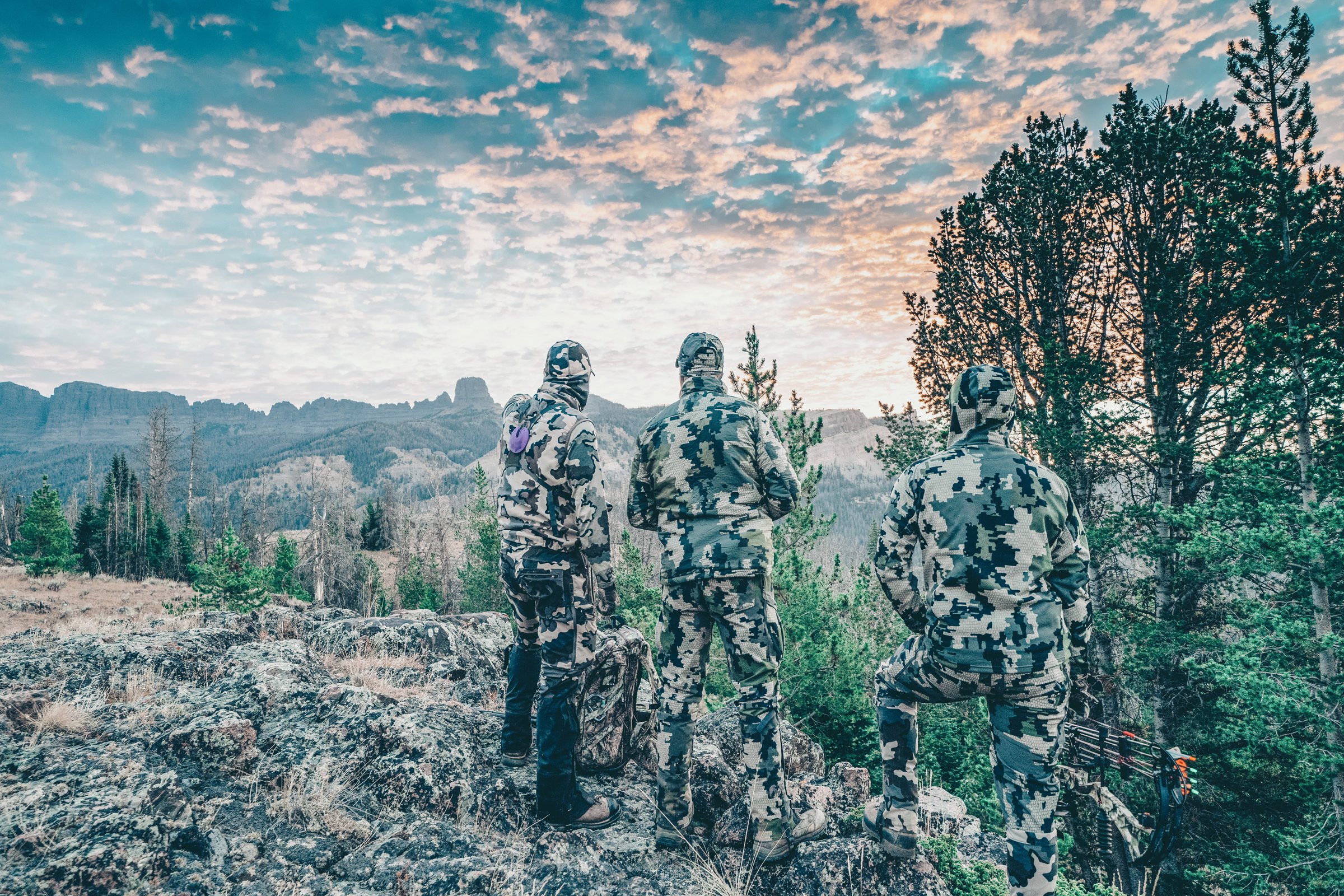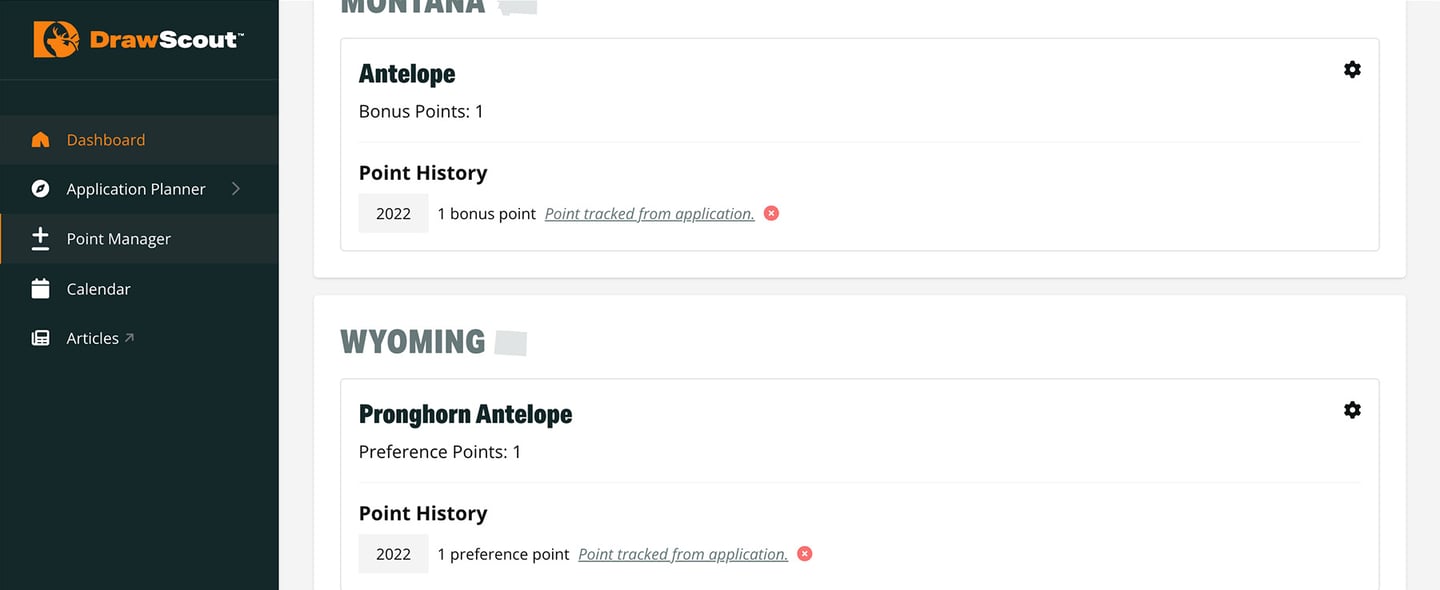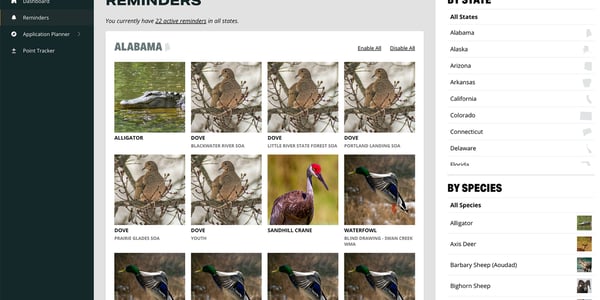Creating a Hunting Application Budget
Hunting and applying for tags throughout the country can be expensive. In order to continually afford point purchases, applications, and successful trips every year, most of us need to set a realistic budget and stick to it. DrawScout helps hunters estimate costs and nail down their budget.

Building a Hunting Budget
One of the first things I like to do each offseason is come up with my year’s budget. My budget typically consists of these items:
- Required License Costs
- Application & Processing Fees
- Non-refundable, Upfront Costs (Reservation Fees)
- Tag Costs (Upfront/Refundable)
- Tag Costs (If Successfully Drawn and OTC)
- Other Costs for Successful Tags (Tresspass Fees, Lodging, etc.)
- Point Purchase Costs
DrawScout estimates totals for each state in your plan and is an important tool in this process.

Determine Your Maximum Budget for the Year
The maximum you plan to spend in a given year is of course going to be different for everyone and based on your own personal situation.
Aside from your financial means, it’s also important to consider how many tags you could try to fill. We all have other obligations, and there are only so many days in a year most of us can hunt.
There’s no point in having a $10,000 budget when you can only try to fill $2,000 worth of tags.
Determine Applications to Target and Their Costs
Once you have a personal budget number, it’s time to figure out how to use it.
Check Your Current Point Totals
Make sure you know how many points you have for each species in each state. This will help you narrow down the hunts you plan to target.
If you’re a DrawScout member, automatic and manual point tracking is available in Point Manager.

Choose Your Applications and Tags
Next, make a list of all of the applications and tags you’re going to apply for or purchase. Note the costs associated with each, if the costs are upfront, and which portions are refundable. Having a full list of applications and possible tags will allow you to remain within your maximum budget.
Required License Costs
Each state will have different required licenses. Some states will require licenses just to apply for the draw, while others will only require them if successful. Note the cost of each and factor them into your budget.
DrawScout helps with this process by including licenses and costs in your application plan.

Application & Processing Fees
Most states charge a non-refundable application fee for each species. Sometimes this applies only to primary draws. Some states also charge a processing fee. This can be a flat rate or a percentage of your total.
Depending on the number of tags you apply for, these fees can add up quickly. Be sure to account for these as they may be a substantial part of your budget.
Other Non-refundable, Upfront Costs
You may also have some other non-refundable costs that aren’t directly charged by a state. A popular example is if you plan to hunt private land, and the owner charges a non-refundable reservation fee.
Upfront, Refundable Costs
Some states charge the full tag price upfront when applying. It’s only when you are unsuccessful in the draw that this amount is refunded. This can sometimes take months, depending on when you submit your application and when the draw takes place.
Minimize the time states hold your money by applying close to the deadline. Build your applications in DrawScout ahead of time so that you’re plan is ready to go.
Additional Costs if Successfully Drawn
Here, it’s time to get granular. If successfully drawn, each hunt will have additional expenses. These could be trespass fees, guides, lodging, fuel, and more. Everyone handles these costs differently. Include whatever makes sense for you.
DrawScout allows you to add these custom costs to your application plan, and only count them if successful.

Determine Point Purchase Costs
In addition to your applications, make sure to account for any point purchase costs for the year. These may be states and species in which you’ll only purchase points, or it may be point purchases that are required after an unsuccessful application. Wyoming’s preference point system, for example, requires you to purchase your point even if unsuccessful.
Understand Tag Returnability
Sometimes you get too lucky. Or sometimes life happens and you have to change your plans. Be sure to understand each state’s tag return policies, so you can get your funds, points, or both back in the event of a canceled hunt.

Have a Plan for Leftover Budget
Sometimes you’re not lucky enough. If you have a $4000 budget and draw $500 worth of tags, have a backup plan. That could be going on a private land hunt using landowner vouchers, buying a new rifle that you’ve been eyeing, or saving the money for an increased budget in the future.
Get Everyone on Board
Share your budget plan with whoever in your life needs to know about it. Surprise expenses can ruin a hunt — whether that’s within your hunting party or at home.
DrawScout allows for easy export of your application plan via PDF or email.
Build Your Plan in DrawScout
DrawScout makes estimating your total application cost and staying within budget easier than ever. Skip the notes, calculators, and spreadsheets. DrawScout estimates totals per state and for your application plan as a whole.



